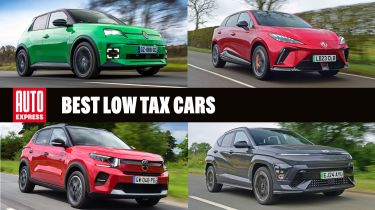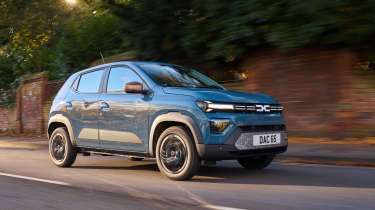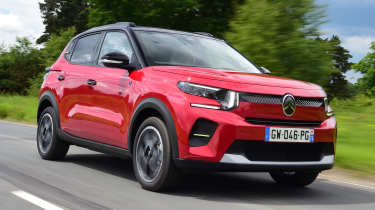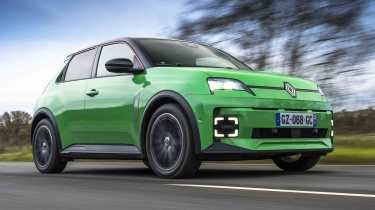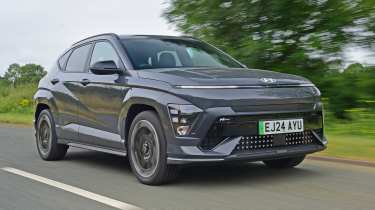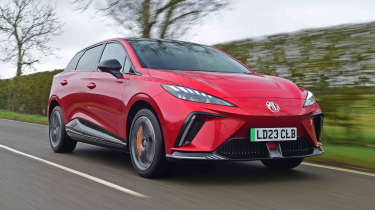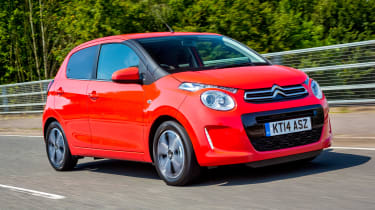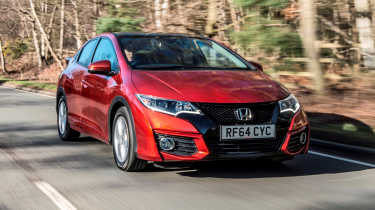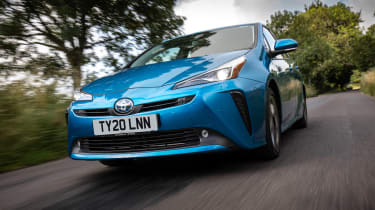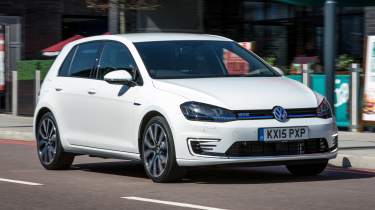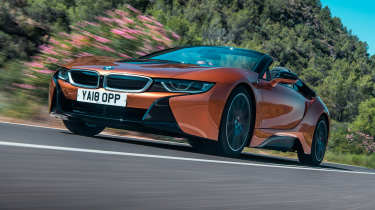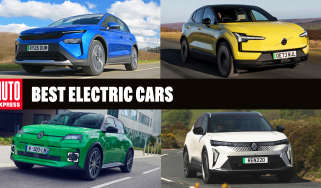Best low tax cars 2025: New EVs and used ICE cars with cheap VED road tax
From April 2025 the VED tax bands change. Here are ten cars that avoid the worst of the extra expense
Running an electric car was previously the quickest route to zero-rate VED (Vehicle Excise Duty or ‘road tax’) . With no tailpipe emissions, they always sat in the lowest band A, with a big fat zero in the debit column each year.
That has changed a little with April 2025’s new tax regulations. While the first-year rate of £10 still doesn’t sound bad, and it’s £100 cheaper than anything producing even a single gram of CO2 per kilometre, the rates from year two onwards are a little less rosy. Essentially, EV owners will have to pay the same £195 per year in road tax as everyone else – as will existing EV owners, if their car was registered after April 2017.
It gets worse too, because the ‘expensive car supplement’ surcharge for vehicles that cost more than £40,000 also now applies to EVs. Since EVs are typically quite expensive, that means a huge chunk of the market is now susceptible to an additional £425 per year in the second to sixth years of registration - or £620 per year in total.
Below, we’ve selected five brand new EVs that escape that expensive car supplement surcharge (and are generally cheap to run), plus five pre-2017 cars that are still taxed on the old system based on CO2 emissions. While still subject to VED, these older cars sit in the lowest possible tax band and will only cost you £20 a year, making them cheaper to tax than a one-year-old EV.
Low-tax electric cars
The rules here are simple: If you don’t spend more than £40,000 on a new car, you don’t fork out £620 a year in tax from year two onwards. Thankfully, that’s still possible in the modern EV market, helped by the price ceiling coming down a bit in recent years, with various EV models that cost barely more (or sometimes less) than regular petrol superminis. There are still some quite roomy and good-to-drive cars available under £40k too.
Dacia Spring
- Prices from £15,000
| Pros | Cons |
|
|
If we’re talking low tax, we might as well talk ‘low everything’. As the cheapest proper electric car on sale in the UK, the Dacia Spring is probably about as little as you can get away with paying to run a car in just about every metric. Starting with tax, its 0g/km CO2 rating means a £10 first-year tax bill, just like any electric car, and with £14,995-£16,995 pricing that’s miles away from the luxury car surcharge, it’s the standard £195 per year after that, just like everything else.
But of course, being small and light with a small battery, charging isn’t going to break the bank either – a 0-100% top-up of the 26.8kWh pack, enough for a real-world range of more than 130 miles in our experience, won’t cost you more than about £2.50 on an overnight economy tariff. Call it £20 to do a thousand miles. And even if you’re a higher-rate taxpayer, BiK company car tax will only just scrape past £200 in 2025-2026.
See our new Dacia Spring discounts
Citroen e-C3
- Prices from £22,000
| Pros | Cons |
|
|
We’re selecting another Auto Express favourite here, a previous New Car Awards winner. While not as absurdly cheap as the Spring to buy or run, you’re looking at identical VED bills, with the same £10 first-year rate and £195 thereafter – the £21,990 starting price is barely more than halfway to the £40k tax surcharge zone.
It’s not only the low running costs we like with the Citroen e-C3 though. Its compact body (just about 4 metres long on the dot) hides generous interior space, in part thanks to pseudo-SUV styling which allows for a high roof. Clever use of materials stops the cabin feeling too cheap, and it’s got a typically Citroen ride too: smooth and relaxing, whether in town or on the motorway.
See our new Citroen e-C3 discounts
Renault 5 E-Tech
- Prices from £23,000
| Pros | Cons |
|
|
The fabulous new Renault 5 tops out at under £29,000 in its top-spec Iconic trim with the 148bhp motor and larger battery. In fact, even the sporty Alpine A290, the 5’s hot-hatch cousin, undercuts the luxury vehicle surcharge, so all 5s and A290s will cost the same £10 in VED in year one, and £195 per year afterwards.
The 5’s greatest appeal though is its styling, with part-retro, part-futuristic design that nods to the 5’s 1970s namesake, and knocks the MINI Cooper E off its perch as the most distinctive small electric car on the roads. It feels grown-up to drive, and the 249-mile range of the more powerful, larger-battery cars is pretty good for a supermini EV too. Cars this cheap to tax don’t come much more likeable.
See our new Renault 5 discounts
Hyundai Kona Electric
- Prices from £35,000
| Pros | Cons |
|
|
The Hyundai Kona Electric is a great all-rounder, and while some models creep over the £40k limit that sees their VED rocket to £620 per year in their second to sixth years on the road, several models are available below that point, for a much more modest £10 in the first year and £195 a year going forward.
You’ll want Advance specification to dodge the surcharge, which while being the entry-level model, gets plenty of standard kit, from 17-inch alloys to smart cruise control, a heat pump, and a 12.3-inch touchscreen. Even better, you’ll still be under £40k if you tick the box for the larger 65kWh Long Range battery model, with up to 319 miles of WLTP range. The interior looks and feels good, and the Kona offers a comfortable drive, too.
See our new Hyundai Kona Electric discounts
MG4
- Prices from £27,000
| Pros | Cons |
|
|
As an alternative to the Kona Electric, to serve that sensible electric family car role, how about the MG4? Since launch it’s offered great value and despite price increases, you can still get a lot for your money: just over £36,000 is enough for an Extended Range model capable of up to 323 miles, and the slightly silly 429bhp XPower model is the same price, meaning all MG4s avoid a hefty tax surcharge.
We’d probably steer clear of the XPower in reality, as quick though it is (3.8 seconds from 0-62mph), range suffers (239 miles) and it’s less fun to drive than the figures suggest. But all MG4s generally drive well, charge quickly, and come well-equipped.
The best pre-2017 low tax cars
If you own a low-emissions car registered after March 2001 and before April 2017, then much like modern electric car buyers, you’ve probably not had to pay a penny in VED until now. That changes from April 2025, but the good news is that taxing those previously free cars will still be very cheap: they essentially move up to the old Band B, which is still only £20 a year.
Citroen C1
Cars like the Citroen C1 remain a popular choice with first-time drivers and those looking to keep car ownership costs to a minimum. They’re effortlessly economical, achieving 60mpg with ease, but this economy also meant that they had low CO2 emission ratings, and this meant little to no car tax. It only applies to certain models, notably 1.0-litre cars registered before WLTP fuel economy tests were brought in. As these tests were stricter, combined mpg numbers tumbled and official CO2 emissions went up accordingly.
Thankfully, this was only implemented in 2019, and since we’re looking at pre-2017 cars, almost all will be either under 100g/km or 110g/km, both of which attract the same £20 bill. The same applies to the C1’s Peugeot 108 and Toyota Aygo siblings, as well as several variants of the Volkswagen up! and its SEAT and Skoda equivalents.
Honda Civic
Diesel has fallen out of favour in modern vehicles but for a while it was the easiest way to achieve low CO2 figures, because official fuel economy figures in the 70-80mpg range just about guaranteed zero-rate VED. One of those offering intergalactic fuel economy was the ninth-generation Honda Civic, with the 1.6-litre i-DTEC diesel offered from 2012 until 2017.
While power was an unspectacular 118bhp, economy of 78.5mpg combined on the old NEDC test meant CO2 of only 94g/km, well under the old 100-gram limit for free tax. That means that while you now have to stump up some money for the Civic’s annual VED, it’s still only 20 quid. Best of all, they’re very reliable and still return excellent real-world economy. In true Honda style, it’s also reasonably refined, even by modern standards.
See our used Honda Civic deals
Toyota Prius
The Toyota Prius is the classic high-economy, low-emissions choice, so it’s no surprise at all that just about every past variant will still qualify you for low VED even after the April 2025 changes. 2016 fourth-generation Prius models offered a fuel economy figure of up to 67.3mpg, which meant 78g/km of CO2, or even lower if you find a plug-in model; that’s £20 a year.
The previous generation model ran from 2009 to 2015, promised economy in the 70mpg range, and again ducked well under 100g/km, so it’s £20 for those too. Only when you go back to the second-generation car, from 2004-2009, does CO2 climb over the 100g/km barrier, but since the £20 bracket goes up to 110g/km now, the annual tax doesn’t increase. Even the first-generation Prius, at 114/gkm, will only cost £35 from April.
See our used Toyota Prius deals
Volkswagen Golf GTE
If the Prius is a bit dull, here’s a pre-2017 hybrid – specifically, a plug-in hybrid – that can still treat you to low VED bills but offers a little more in return for the driver. Essentially, the Volkswagen Golf GTE is a plug-in hybrid version of the celebrated Golf GTI – or that’s what VW would like you to believe, anyway.
The reality is that the GTE was never quite as fun as the GTI, its 1.4-litre hybrid powertrain and extra weight taking the edge off the GTI’s performance. But it was still brisk, with a 7.6-second 0-62mph time (1.1 off the GTI at the time), would get you roughly 20 miles of EV range, and had quoted CO2 emissions of 39g/km, for that all-important free VED at the time. It’s just £20 with April 2025’s increase. Based on the Mk7 Golf, it’s also just a brilliant all-rounder – and cheaper to tax than the latest Mk8 GTE.
See our used Volkswagen Golf GTE deals
BMW i8
Here’s our wildcard choice. Short of a Tesla Roadster, a pre-2017 performance car won’t come much cheaper to tax than the BMW i8. The dramatically-styled coupe was launched in 2014 and thanks to its plug-in hybrid drivetrain, BMW claimed CO2 emissions of only 49g/km. That doesn’t look much by modern plug-in standards, but meant free VED at the time, and a scant £20 bill today.
Early cars will get you only around 20 miles of EV driving on a charge, but real-world economy of over 40mpg is eminently possible. If you can resist stretching its 357bhp part-electric, part 1.5-litre three-cylinder turbocharged drivetrain, anyway. The i8 is no Porsche 911 in the twisties but it’s still fun, and still looks incredible. 20-quid tax is just the cherry on the icing.
Our dealer network has 1,000s of great value new cars in stock and available now right across the UK. Find your new car…

